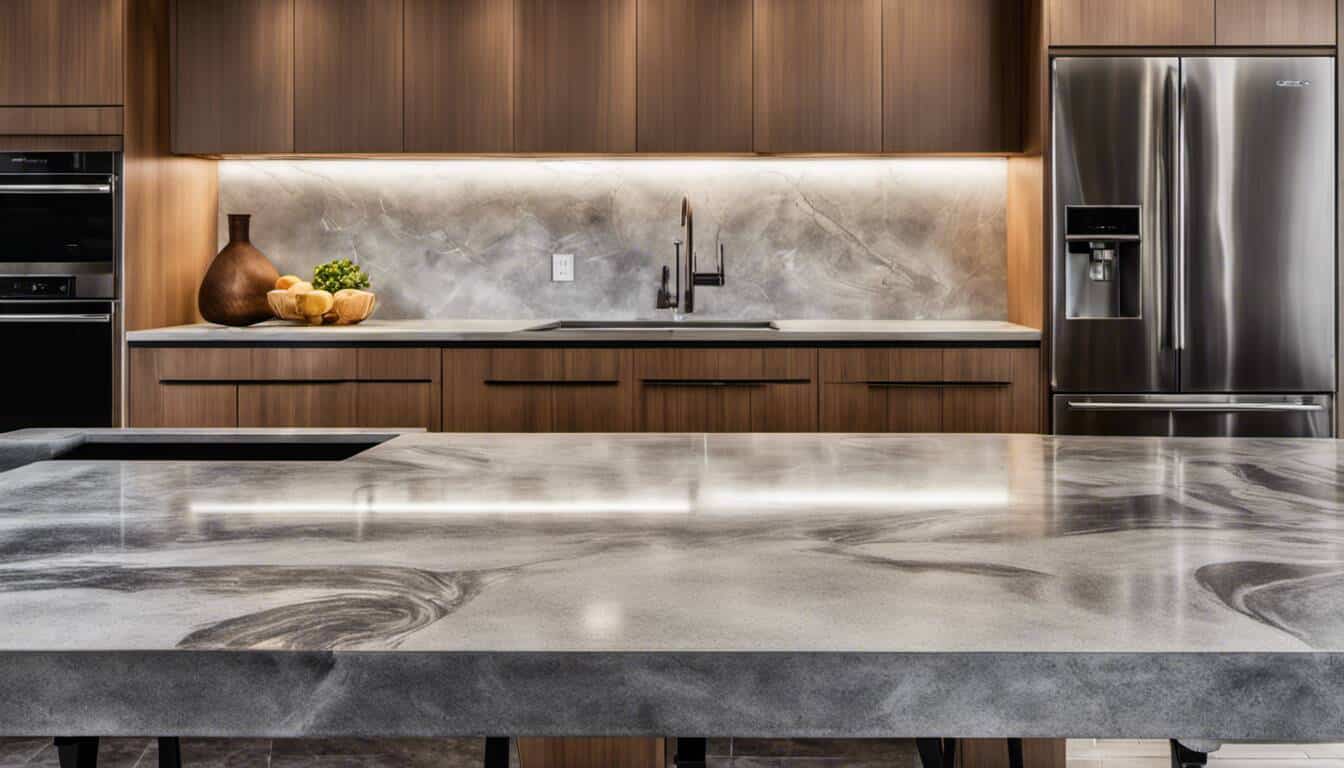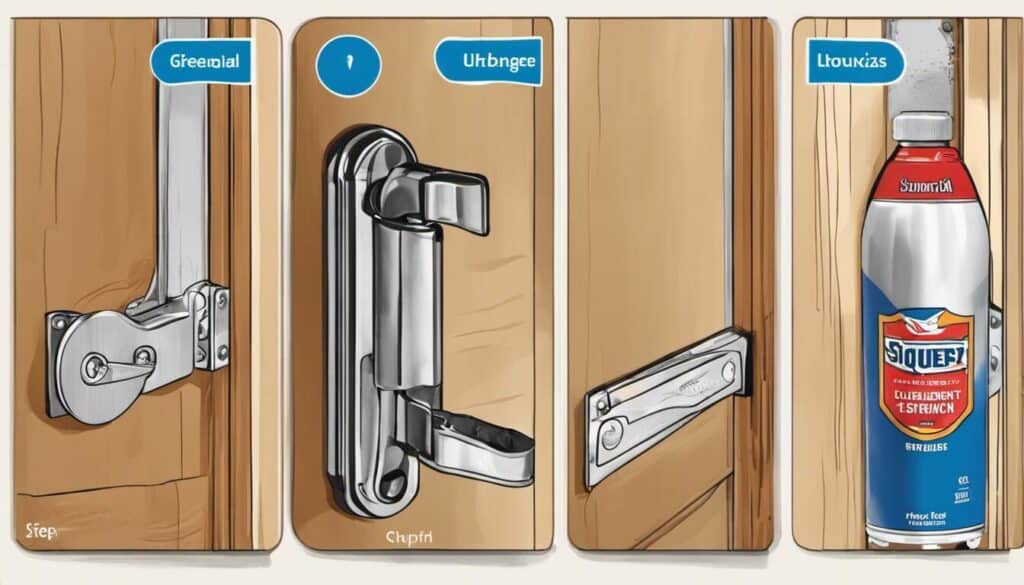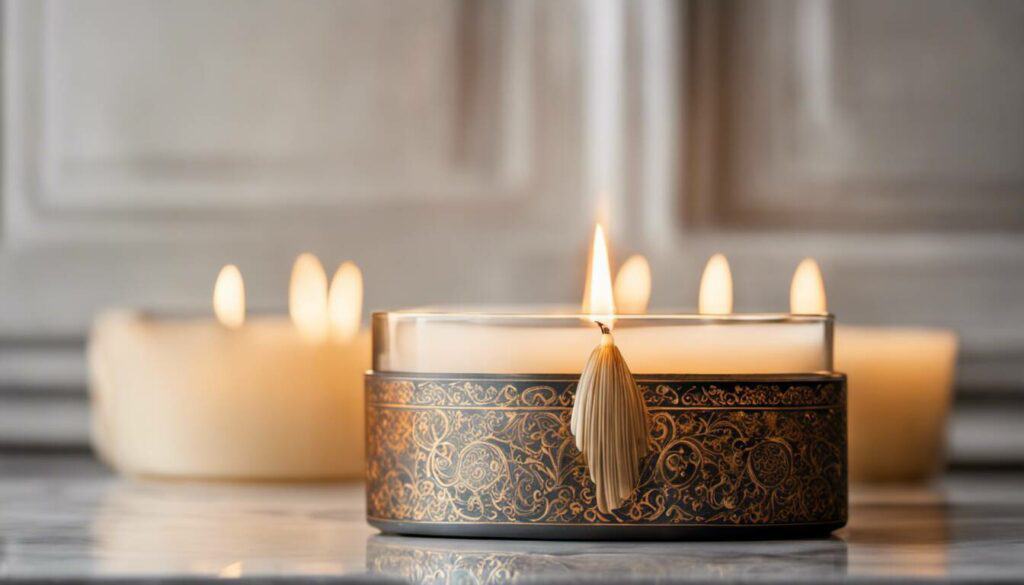In my journey to revamp my kitchen, I found that the countertop is a crucial element that demands thoughtful consideration. If you’re seeking a blend of durability and contemporary design, concrete counters might just be the perfect fit. Breaking conventions and surpassing expectations, these sturdy yet stylish surfaces have transformed my culinary space. Offering both aesthetic appeal and long-lasting performance, concrete countertops are increasingly becoming a favorite choice in kitchen remodeling. Explore this detailed guide to see if this standout material aligns with your vision for the ideal kitchen.
Concrete countertops offer several advantages for a kitchen remodel, including their modern and durable nature. They are customizable and can be less expensive than granite countertops. They also require minimal maintenance and are resistant to cracking or breaking. However, it is important to note that acid stains can occur on the surface if cooking acids come into contact with it, and they may not be appealing to everyone due to their industrial unfinished look.
“Concrete counters offer an unparalleled durability bound to withstand the test of time and intensive use. The adaptability of this material allows for a wide array of customization, suited to match any kitchen style or design. Given my long-standing experience in remodeling, I can confirm that concrete counters not only add a distinctive aesthetic to your kitchen but also offer an incredible return on investment in terms of function and longevity.”
Gideon Prescott, Interior Designer
Benefits of Concrete Counters
Concrete countertops have gained popularity in recent years as a modern and durable choice for kitchen remodeling. What are the key benefits that make them stand out among other options?
Firstly, concrete countertops offer a sleek and smooth surface with a perfect shade of gray, without the need for dyes or additional materials for color. The natural beauty of untreated concrete provides a contemporary aesthetic that complements various kitchen styles.
Moreover, concrete is renowned for its durability and strength. It is resistant to scratches, heat, and stains when properly sealed. Unlike other countertop materials, such as butcher block or slab granite, concrete countertops require less maintenance, making them an attractive option for homeowners seeking long-term reliability.
Furthermore, concrete counters present endless design possibilities due to their versatility and customizability.
- As per a 2022 survey by Houzz, nearly 10% of homeowners who remodeled their kitchens chose to install concrete countertops.
- According to an industry report, DIY concrete countertops can save homeowners up to 50% in comparison with professionally installed granite countertops.
- Home Innovation’s Annual Kitchen and Bath Survey reports that concrete is one of the fastest-growing countertop materials, with its usage increasing by about 17% each year.
- Concrete countertops are a popular choice for kitchen remodeling because they offer a sleek and contemporary aesthetic, are durable and low-maintenance, and allow for endless design possibilities.
Versatility and Customizability
One of the most appealing aspects of concrete countertops is their versatility and ability to be customized according to individual preferences. When it comes to kitchen remodeling, having countertops that fit seamlessly into your overall design vision is crucial.
Concrete counters can be tailored to suit various styles – from minimalist chic to rustic charm. The material can be shaped and molded to accommodate unique curves or angles, allowing for creativity and innovation in design.
Not only can you select the dimensions and shape of your countertops, but you can also experiment with different finishes. Whether you prefer a polished glossy look or a more textured matte appearance, concrete offers flexibility in achieving the desired aesthetic.
Additionally, concrete counters can be stained or pigmented to achieve different hues or tinges. This opens up exciting opportunities for customization, enabling you to match your countertops with the overall color scheme of your kitchen or create a striking contrast.
Lastly, if you desire additional features like integrated sinks or decorative elements embedded within the countertop surface, concrete allows for seamless integration.
Concrete Counter Installation Options
When it comes to installing concrete countertops for your kitchen remodeling project, you have two main options to consider: DIY or professional assistance. Each option has its own set of advantages and considerations, so let’s explore them further.
If you are a skilled and confident DIY enthusiast, tackling the installation yourself can be a fulfilling and cost-effective choice. DIY concrete countertop installation allows for greater customization in terms of design and size. You have the freedom to create unique shapes and finishes that perfectly match your vision for the kitchen. Additionally, by taking on the project yourself, you can save money on labor costs.
Take Sarah, for example. She and her husband Scott were passionate about home improvement projects and decided to install their own concrete countertops. They enjoyed the process of creating molds using melamine-coated particle board, pouring and leveling the concrete mix, and finally sealing and waxing the countertops. The end result was a beautiful and personalized kitchen space that they were proud of.
However, it is important to note that DIY installation does require a certain level of skill and experience with working with concrete. It can be physically demanding and time-consuming. You will need to ensure the accuracy of your measurements, properly mix the concrete, and handle any unforeseen challenges that may arise during the installation process.
DIY vs Professional Assistance
Deciding between DIY installation or seeking professional assistance ultimately depends on your level of expertise, budget, and time constraints.
If you are new to working with concrete or prefer to leave the job to experts who have years of experience, hiring professionals is a wise choice. A professional contractor will have the knowledge, tools, and skills necessary to ensure a smooth and successful installation. They can provide guidance on design choices, handle precise measurements, expertly pour the concrete, polish it to perfection, and apply a durable finish for long-lasting results.
On the other hand, if you are up for the challenge and have confidence in your DIY abilities, taking on the installation yourself can be a rewarding experience.
When considering the DIY approach, it is important to carefully evaluate your own capabilities and resources. Assess whether you have the necessary tools, time, and patience to complete the project to your satisfaction. Additionally, consider any potential risks or challenges that may arise along the way. Are you prepared to troubleshoot issues or invest extra time into learning new techniques?
Ultimately, both options have their merits and drawbacks. It’s crucial to choose an installation method that aligns with your skills, budget, and desired outcome for your kitchen renovation project.
Cost of Concrete Countertops
Concrete countertops have gained popularity as a modern and durable choice for kitchen remodeling. However, it’s essential to consider the cost factor when deciding on this material. The price of concrete countertops can vary depending on various factors such as the size of the project, customization options, and geographic location.
On average, concrete countertops cost between $50 to $100 per square foot. This price range includes both materials and installation costs. Keep in mind that additional expenses may be incurred for features like edges, color pigmentation, sealants, or decorative elements.
However, it’s crucial to note that the cost of concrete countertops can be significantly higher than other materials commonly used for kitchen counters. Factors like complexity of design and additional customization can further increase the overall cost.
Affordability Compared to Other Materials
When considering the affordability of concrete countertops compared to other materials, it’s important to examine the long-term value they provide. While concrete may have a higher upfront cost, its durability and longevity can make it a cost-effective investment over time.
Think of it this way – buying a high-quality pair of shoes may require a larger initial investment compared to a cheaper alternative. However, the durability and lifespan of the higher-quality shoes may ultimately result in long-term savings since you won’t have to replace them as frequently.
Concrete countertops offer advantages such as resistance to heat, scratches, and stains, which can reduce maintenance and potential repair costs in the future. Additionally, their versatility allows for customization options that can enhance the overall aesthetic appeal and value of your kitchen.
Nonetheless, it’s worth noting that affordability is relative and subjective based on individual budget constraints and preferences. Some homeowners may find more affordable alternatives like laminate or tile countertops more suitable for their needs.
It’s advisable to consult with professionals in the industry who can provide accurate estimates of the total cost and compare it to other materials available. Ultimately, the affordability of concrete countertops will depend on your unique circumstances and priorities.
Potential Drawbacks of Concrete Counters
Concrete counters, despite their modern and durable appeal, are not without their challenges. It’s important to consider these potential drawbacks before making a decision for your kitchen remodeling project.
Maintenance and Longevity Issues
While concrete counters are known for their durability, they do require regular maintenance to keep them looking their best. One of the main concerns is the possibility of staining. Concrete is porous, which means it can absorb spills and stains if not properly sealed. Cooking acids such as vinegar or lemon juice can also cause acid stains on the surface if left unattended. However, with proper sealing and regular resealing, you can minimize the risk of staining.
Another factor to consider is longevity. While concrete is sturdy, it may develop hairline cracks over time due to settling or fluctuations in temperature. Proper installation and regular maintenance can help mitigate these issues. Additionally, heavier items placed on the countertop may require additional support inside the cabinets to handle the weight effectively.
For example, if you frequently use heavy cooking equipment like a stand mixer or a large cast-iron skillet, it’s essential to ensure that the cabinets underneath are reinforced to avoid any structural problems.
However, it’s worth noting that these potential drawbacks can be managed with proper care and maintenance. Regular cleaning using mild soap and water and avoiding harsh chemicals or abrasive cleaners is crucial for preserving the appearance of concrete counters. Also, proactively addressing any visible cracks or chips by consulting professionals can help extend their lifespan.
Understanding both the advantages and disadvantages of concrete counters allows you to make an informed decision for your kitchen remodeling project. In the next section, we will explore some tips for maintaining your concrete counters to ensure their longevity.






As someone who’s installed hundreds of countertops, I can corroborate the growing popularity of concrete counters – especially among clients seeking a modern yet rustic aesthetic. They’re not only versatile but, if sealed properly, they can be incredibly resistant to heat, scratches, and stains as well.
I attempted installing concrete countertops in my kitchen last year, despite my initial reservations about straying from hardwood. My experience wasn’t too great – their upkeep was more intensive than I bargained for and I found the cold and harsh aesthetic rather uninviting. While they did prove hardy, I ultimately reverted back to a warm wooden surface that feels more “me”.
I can understand how some people might find concrete countertops cold and harsh, Knox. However, I think it’s essential to integrate this material thoughtfully with the rest of your kitchen’s aesthetic. Depending on the accent pieces, lighting, and even the color scheme you choose, concrete can provide a unique modern vibe while efficiently serving its function.
Certainly, Phaedra, the versatility of concrete countertops can’t be ignored, but from my experience, maintaining them requires a delicate touch. They might stain easily if not sealed properly which becomes even more important if you cook often or have kids around. Moreover, they might also develop cracks over time if not installed correctly or subjected to heavy weights frequently. Hence it is crucial to pay attention to these aspects while considering all available options for countertop materials before making a definitive choice.
While I agree with your perspective, Irwin, let me assure you that proper sealing can indeed protect from stains. Also, with just a bit of conscious effort, we can ensure the countertop doesn’t bear excessive loads to avoid cracking. Proper maintenance can actually do wonders for the longevity of these counters.